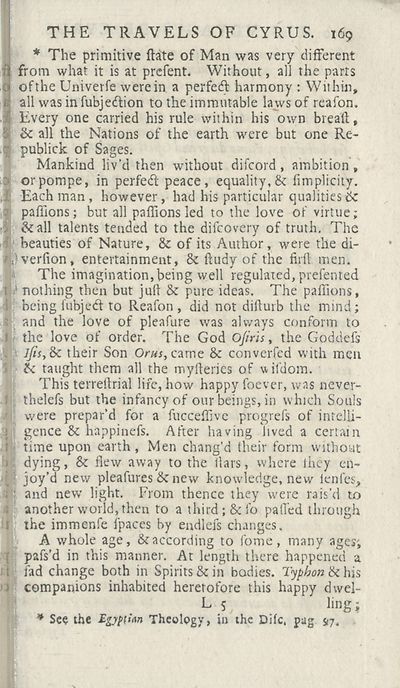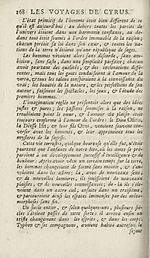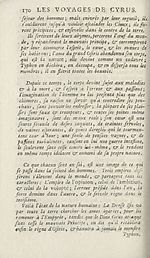Download files
Complete book:
Individual page:
Thumbnail gallery: Grid view | List view

THE TRAVELS OF CYRUS. 169
* The primitive ftate of Man was very different
from what it is at prcfent. Without, all the parts
of the Univerfe were in a perfeft harmony : Within,
all was in fubjedtion to the immutable laws of reafon.
Every one carried his rule within his own breall.
Sc all the Nations of the earth were but one Re-
publick of Sages.
Mankind liv'd then without difcord, ambition ,
orpompe, in perfedt peace, equality,&: fimplicity.
Each man , however, had his particular qualities Sc
paffions; but all paffions led to the love of virtue;
&all talents tended to the difcovery of truth. The
beauties of Nature, & of its Author, were the di-
'verfion, entertainment, 8c ftudy of the firfl men.
The imagination, being well regulated, prefented
1 nothing then but juft & pure ideas. The paflions,
'• being fubjedt to Reafon , did not difturb the mind;
and the love of pleafure was always conform to
the love of order. The God Of/ris, the Goddefs
i ]Jis,8c their Son Orar, came & converfed with men
I 8c taught them all the myfteries of wifdom.
j= This terreftrial life, how happy foever, was never-
I thelefs but the infancy of our beings, in which Souls
I were prepar’d for a fucceffive progrefs of inrelli-
I gence & happinefs. After having lived a certain
time upon earth, Men chang'd their form without
■ dying, & flew away to the liars, where they en¬
joy’d new pleafures 8c new knowledge, new fenl'es,
and new light. From thence they were rais’d to
another world, then to a third ;&fo pafl’ed through
the immenfe ipaces by endlefs changes,
A whole age, & according to fome, many ages;
pafs’d in this manner. At length there happened a
fad change both in Spirits 8c in bodies. Typhon 8c his
companions inhabited heretofore this happy dwel-
L s lingj;
* See the Egyptian Theology, in the Ditc. pag 517,
* The primitive ftate of Man was very different
from what it is at prcfent. Without, all the parts
of the Univerfe were in a perfeft harmony : Within,
all was in fubjedtion to the immutable laws of reafon.
Every one carried his rule within his own breall.
Sc all the Nations of the earth were but one Re-
publick of Sages.
Mankind liv'd then without difcord, ambition ,
orpompe, in perfedt peace, equality,&: fimplicity.
Each man , however, had his particular qualities Sc
paffions; but all paffions led to the love of virtue;
&all talents tended to the difcovery of truth. The
beauties of Nature, & of its Author, were the di-
'verfion, entertainment, 8c ftudy of the firfl men.
The imagination, being well regulated, prefented
1 nothing then but juft & pure ideas. The paflions,
'• being fubjedt to Reafon , did not difturb the mind;
and the love of pleafure was always conform to
the love of order. The God Of/ris, the Goddefs
i ]Jis,8c their Son Orar, came & converfed with men
I 8c taught them all the myfteries of wifdom.
j= This terreftrial life, how happy foever, was never-
I thelefs but the infancy of our beings, in which Souls
I were prepar’d for a fucceffive progrefs of inrelli-
I gence & happinefs. After having lived a certain
time upon earth, Men chang'd their form without
■ dying, & flew away to the liars, where they en¬
joy’d new pleafures 8c new knowledge, new fenl'es,
and new light. From thence they were rais’d to
another world, then to a third ;&fo pafl’ed through
the immenfe ipaces by endlefs changes,
A whole age, & according to fome, many ages;
pafs’d in this manner. At length there happened a
fad change both in Spirits 8c in bodies. Typhon 8c his
companions inhabited heretofore this happy dwel-
L s lingj;
* See the Egyptian Theology, in the Ditc. pag 517,
Set display mode to:
![]() Universal Viewer |
Universal Viewer | ![]() Mirador |
Large image | Transcription
Mirador |
Large image | Transcription
| Antiquarian books of Scotland > Adventure and adventurers > New Cyropaedia, or The travels of Cyrus > (195) |
|---|
| Permanent URL | https://digital.nls.uk/120271906 |
|---|
| Description | Thousands of printed books from the Antiquarian Books of Scotland collection which dates from 1641 to the 1980s. The collection consists of 14,800 books which were published in Scotland or have a Scottish connection, e.g. through the author, printer or owner. Subjects covered include sport, education, diseases, adventure, occupations, Jacobites, politics and religion. Among the 29 languages represented are English, Gaelic, Italian, French, Russian and Swedish. |
|---|

